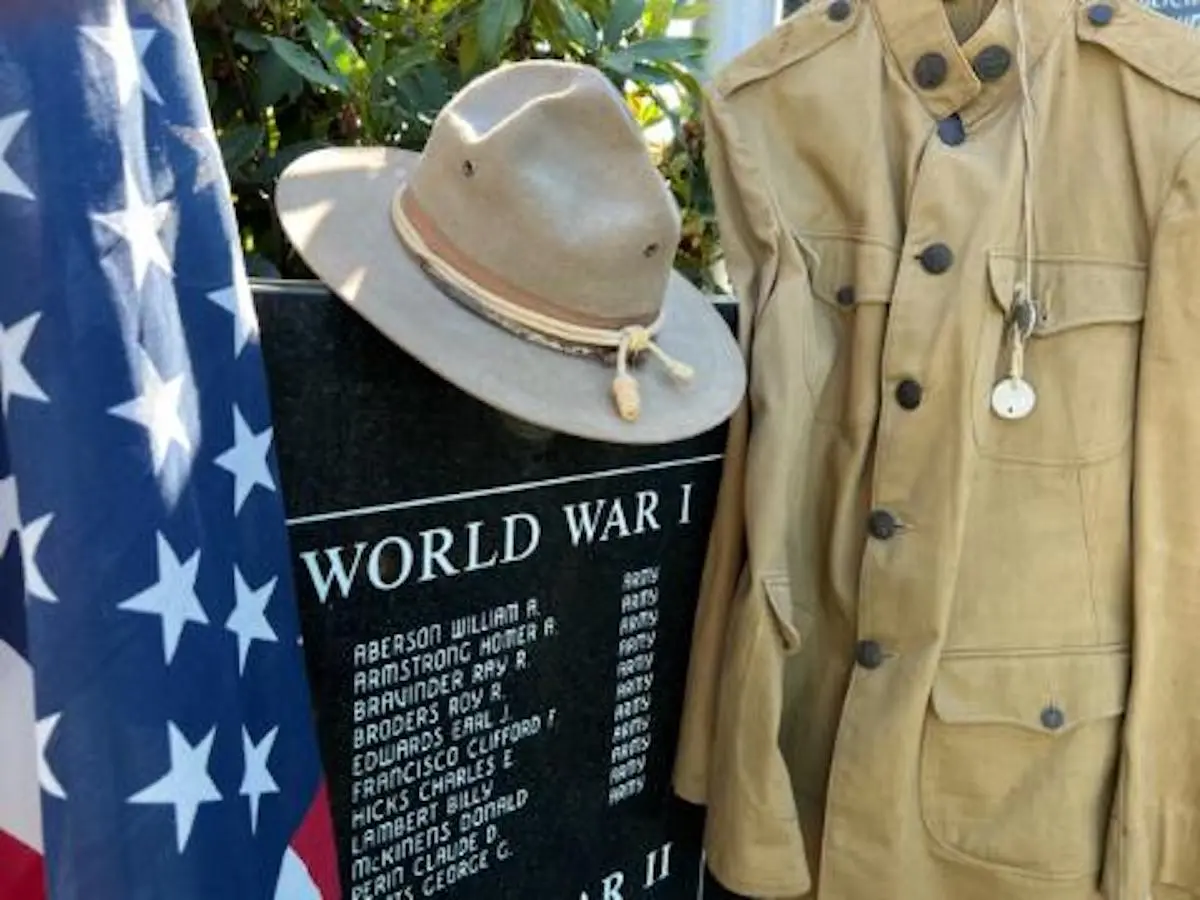Doughboy from Philomath honored 105 years after ultimate sacrifice in World War I
Published: 4 August 2023
By Eric Niemann
via The Philomath News web site

Benton-County-Veterans-Memorial2
A doughboy uniform and flag rest near the names of the fallen from WWI at the Benton County Veterans Memorial. (Photo by Eric Niemann)
Homer Armstrong, who was killed in action July 31, 1918, on the Western Front, receives recognition from the Doughboy Foundation during Daily Taps ceremony in Washington, D.C.
Back in 1916, President Woodrow Wilson maintained a stance of neutrality to keep the United States out of the Great War. Germany was already at war with France and Great Britain, but Wilson wanted the U.S. to stay out of the fight. Despite his focus on neutrality, he nevertheless had the nation’s armed forces prepare for involvement should the need arise.
This stance changed dramatically during the first week of April 1917. On April 1, a German U-boat torpedoed the SS Aztec, an American cargo ship, killing 29 passengers, including 10 American merchant marine crew members, off the coast of France. News of the submarine attack was quickly relayed to Washington, D.C.
The following day, President Wilson met with a joint session of Congress at the Capitol Building. He proposed a resolution to declare war on Germany. The measure read that “The present German submarine warfare against commerce is a war against mankind. It is a war against all nations. American ships have been sunk. American lives taken.”
He went on to say “We are glad … to fight thus for the ultimate peace of the world and for the liberation of its peoples, the German peoples included: for the rights of nations great and small and the privilege of men everywhere to choose their way of life and of obedience. The world must be made safe for democracy ….”
The Senate passed the war measure on April 4 by a count of 82–6 (eight not voting).
The next day at 8 o’clock on April 5, back in Corvallis, Oregon, 80 members of Company K from the Oregon Army National Guard were loading a train with a celebratory sendoff. There were hundreds of people from the county enthusiastically cheering and waving flags or handkerchiefs.
The military cadets from Oregon Agricultural College, what would later become Oregon State University, all marched by to honor the men of Company K. These volunteers were shipping out for training in The Dalles and would eventually deploy “over there” to the Western Front in France.
Private Homer Armstrong was one of these doughboys.
Meanwhile, the House of Representatives met back in Washington, D.C. to review and approve the war resolution by vote. The resolution passed at 3 a.m. April 6 by a vote of 373–50 (eight not voting). America was now at war!
Homer Armstrong was a farm boy who lived with his aunt and uncle, Mr. and Mrs. Alex J. Brown, west of Philomath.
In 2020, I contacted Robert Laplander who works for an organization called Doughboy MIA, which is dedicated to sorting through draft cards, battlefield reports and grave registrations to determine what happened to missing doughboys.
The following few paragraphs were what they sent back to us in Philomath.
Read the entire article on The Philomath News web site here:
External Web Site Notice: This page contains information directly presented from an external source. The terms and conditions of this page may not be the same as those of this website. Click here to read the full disclaimer notice for external web sites. Thank you.



